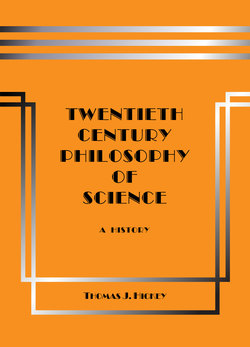Читать книгу Twentieth-Century Philosophy of Science: A History (Third Edition) - Thomas J. Hickey - Страница 46
На сайте Литреса книга снята с продажи.
3.15 Positivist Observation-Theory Dichotomy
ОглавлениеPositivists alleged the existence of “observation terms”, which are terms that reference observed entities or phenomena. Observation terms are deemed to have simple, elementary and primitive semantics and to receive their semantics ostensively and passively. Positivists furthermore called the particularly quantified sentences containing only such terms “observation sentences”. For example the sentence “That raven is black” uttered while the speaker of the sentence is viewing a present raven, is an observation sentence.
In contrast to observation terms there is a third type of term having complex semantics that the positivists called the “theoretical term”. The term “electron” is a favorite paradigm for the positivists’ theoretical term. The positivists considered theoretical entities such as electrons to be postulated entities as opposed to observed entities like elephants. And they defined “theory” as sentences containing any theoretical terms. Many positivists view the semantics of the significant theoretical term as simple like the observation term even though its semantics is not acquired by observation. Carnap was a more sophisticated positivist. He said that the definition determines the whole meaning of the defined term, while the theory determines only part of the meaning of the theoretical term, such that the theoretical term can acquire more meaning as the science containing it develops.
Nominalists furthermore believe that theoretical terms are meaningless, unless these terms logically derive their semantics from observation terms. On the nominalists’ view terms purporting either unobserved entities or phenomena not known observationally to exist have no known referents and therefore no semantical significance or meaning. For example the phrase “tooth fairy” is meaningless, since all fairies are deemed mythical and thus never to have been observed. For nominalists theoretical terms in science receive their semantics by logical connection to observation language by “correspondence rules”, a connection that produced what positivists called “logical reduction to an observation-language reduction base”. Without such connection the theory is deemed to be meaningless and “metaphysical”.
Both the post-positivist Karl Popper and later the logical positivist Carl Hempel have noted that the problem of the logical reduction of theories to observation language is a problem that the positivists have never solved, because positivists cannot exclude what they considered to be metaphysical and thus meaningless discourse from the scientific theories currently accepted both by the neopositivists and by contemporary scientists.
In summary the positivists recognized the definition, the analytical sentence and the theory sentence as exhibiting composition in the semantics of their constituent subject terms.
